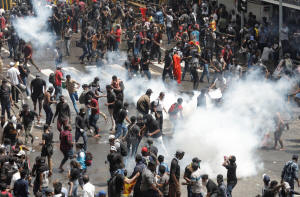Sri Lanka protesters, angered by economic meltdown, storm president's
house
 Send a link to a friend
Send a link to a friend
 [July 09, 2022]
By Uditha Jayasinghe [July 09, 2022]
By Uditha Jayasinghe
COLOMBO (Reuters) -Thousands of protesters
in Sri Lanka's commercial capital Colombo stormed the president's
official residence and his secretariat on Saturday amid months of
mounting public anger over the country's worst economic crisis in seven
decades.
Some protesters, holding Sri Lankan flags and helmets, broke into the
president's residence, video footage from local TV news NewsFirst
channel showed.
Thousands also broke open the gates of the sea-front presidential
secretariat and the finance ministry, which has been the site of a
sit-in protest for months, and entered the premises, TV footage showed.
Military personnel and police at both locations were unable to hold back
the crowd, as they chanted slogans asking President Gotabaya Rajapaksa
to step down.
Two defence ministry sources said President Rajapaksa was removed from
the official residence on Friday for his safety ahead of the planned
rally over the weekend.

Prime Minister Ranil Wickremesinghe on Saturday summoned an emergency
party leaders meeting to discuss the situation and come to a swift
resolution, his office said in a statement.
He has requested the speaker to summon parliament, the statement said.
Wickremesinghe has also been moved to a secure location, a government
source told Reuters.
A Facebook livestream from inside the president's house showed hundreds
of protesters, some draped in flags, packing into rooms and corridors,
shouting slogan's against Rajapaksa.
Video footage of protesters standing and some bathing in the swimming
pool inside the president's home was widely circulated on social media
websites.
Hundreds also milled about on the grounds outside the colonial-era
white-washed building. No security officials were visible.
At least 39 people, including two police were injured and hospitalised
in the protests, hospital sources told Reuters.
ECONOMIC COLLAPSE
The island of 22 million people is struggling under a severe foreign
exchange shortage that has limited essential imports of fuel, food and
medicine, plunging it into the worst economic crisis since independence
in 1948.
Soaring inflation, at a record 54.6% in June and
expected to hit 70% in the coming months, has heaped hardship on the
population.
[to top of second column]
|

Demonstrators run from tear gas used by police during a protest
demanding the resignation of President Gotabaya Rajapaksa, amid the
country's economic crisis, near the president's residence in
Colombo, Sri Lanka, July 9, 2022. REUTERS/Dinuka Liyanawatte

Political instability could undermine Sri Lanka's talks with the
International Monetary Fund seeking a $3 billion bailout, a
restructuring of some foreign debt and fund-raising from
multilateral and bilateral sources to ease the dollar drought.
The crisis comes after COVID-19 hammered the tourism-reliant economy
and slashed remittances from overseas workers, and has been
compounded by the build-up of huge government debt, rising oil
prices and a ban on the import of chemical fertilisers last year
that devastated agriculture. The fertiliser ban was reversed in
November last year.
However, many blame the country's decline on economic mismanagement
by President Rajapaksa. Largely peaceful protests since March have
demanded his resignation.
Thousands of people swarmed into Colombo's government district,
shouting slogans against the president and dismantling several
police barricades to reach Rajapaksa's house, a Reuters witness
said.
Police fired shots in the air but were unable to stop the angry
crowd from surrounding the presidential residence, the witness said.
Reuters could not immediately confirm the president's whereabouts.
Despite a severe shortage of fuel that has stalled transportation
services, demonstrators packed into buses, trains and trucks from
several parts of the country to reach Colombo to protest the
government's failure to protect them from economic ruin.
Discontent has worsened in recent weeks as the cash-strapped country
stopped receiving fuel shipments, forcing school closures and
rationing of petrol and diesel for essential services.

Sampath Perera, a 37-year-old fisherman took an overcrowded bus from
the seaside town of Negombo 45 km (30 miles) north of Colombo, to
join the protest.
"We have told Gota over and over again to go home but he is still
clinging onto power. We will not stop until he listens to us,"
Perera said.
(Reporting by Uditha Jayasinghe, Devjyot Ghoshal; Editing by Rupam
Jain, William Mallard & Shri Navaratnam)
[© 2022 Thomson Reuters. All rights
reserved.]
This material may not be published,
broadcast, rewritten or redistributed.
Thompson Reuters is solely responsible for this content. |